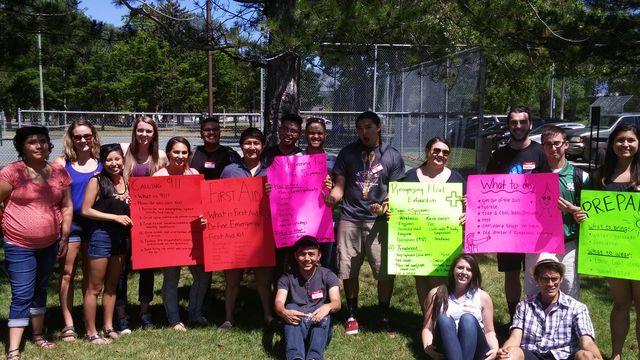When Sam Hawkins sees his fellow medical school students, it’s hard not to notice that he is the only Native American there.
Hawkins, a first-year medical student, attributes some of his success to Utah’s Native American Research Internship (NARI), which brings Native American students to the U to participate in research projects during the summer.
The program started with only four students and has since expanded to 20 students annually from around the United States, said Majia Holsti, medical director of pediatric research education and NARI program director. Since the program’s launch, 95 percent of graduates have received a science degree, and 32 percent have gone to medical or graduate school.
Hawkins is a member of the Muscogee (Creek) Nation. He has participated in cancer research for two summers and later became a project coordinator.
“It solidified a desire to pursue medicine,” Hawkins said. “It was very educational as far as disparities that American Indians go through and the possibilities to help the desperate needs they have.”
Disparities such as high rates of poverty and health problems are what the program is trying to remedy. Hypertension, obesity, cancer, cardiovascular disease and alcohol and drug abuse are common on reservations. Currently, only 0.3 percent of U.S. physicians are Native Americans.
Holsti said one of the best ways to tackle these issues is to have an advocate that can communicate for the group.
“Trust needs to exist between you and your health care provider or if somebody is conducting research,” Holsti said. “There are some cultural barriers that exist that people are not aware of.”
Chalmer Gambler, a senior in health promotion and education, was able to be an advocate during his internship. Gambler traveled to a Navajo reservation to help with eye screenings for glasses. He participated in a research about fat tissue his first summer with NARI and later studied eye diseases, where he continues to work.
Gambler’s research with Balamurali Ambati, professor of ophthalmology at the Moran Eye Center, taught him about the importance of research and reaffirmed his desire to help the native community. Gambler and Hawkins also learned about how to be proud of their native heritage and keep those values in their careers. All NARI participants would meet for talking circles and discuss relevant health and social issues.
“There are several different American Indian communities across the country, and even though they are distinct cultures, there is a lot of similar problems,” Hawkins said.
Sharing ideas about what worked has helped the group learn as a community rather than focusing on their individual tribes.
The program, funded by National Institute of Health and the U’s MD-PhD program, is currently accepting applications for this summer. Students must be juniors or seniors who have taken at least one science class with a lab. Applicants must identify with a Native American tribe, but there is no requirement for how strong that relation is.
@carolyn_webber


